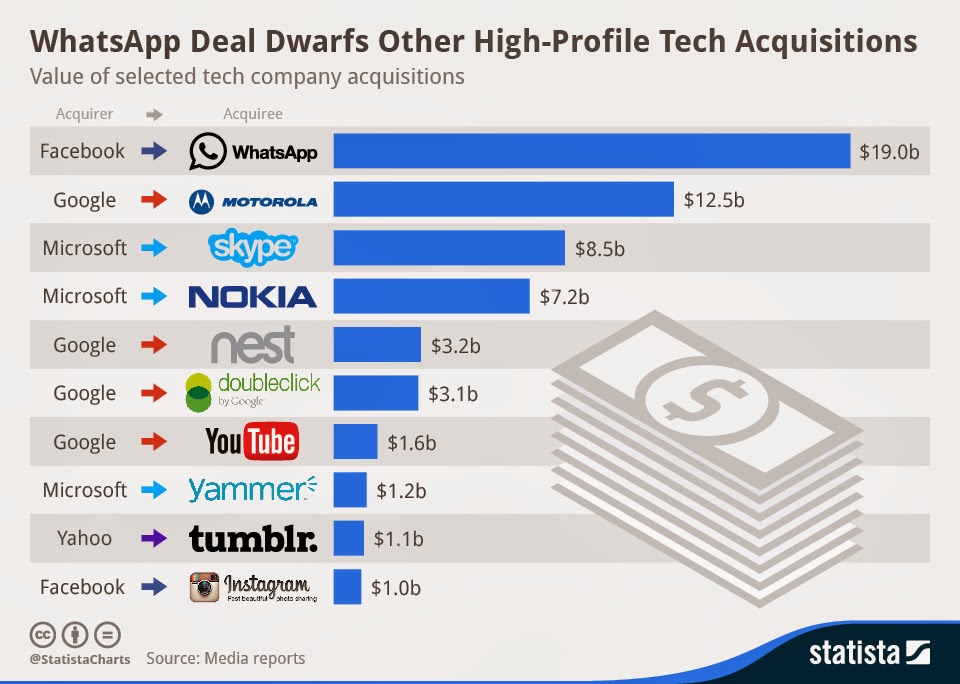Facebook goes the distance to widen reach
Making news over the past few days has been the Facebook-WhatsApp deal, sealed at a whopping offer of US$19bil.
It is the biggest deal year-to-date and has set yet another stratospheric benchmark in the arena of tech deals. The deal pushed 2014’s total tech deals to US$50bil, the highest since 2000.
Google, which contended for WhatsApp as well, lost the acquisition battle with an offer about half the amount Facebook was willing to fork out – US$10bil.
Facebook is hungry for reach, and it has proven in the tech arena that it is willing to go the distance to get it.
Facebook CEO Mark Zuckerberg was reported to have told a conference call that it was Facebook’s explicit strategy to focus on growing and connecting everyone in the world over the next several years.
“And then we believe that once we get to being a service that has one billion, two billion, maybe even three billion people one day, there are many clear ways that we can monetise.
“But the right strategy we believe, is to continue focusing on growth and the product and succeeding in building the best communication tools in the world.”
Yes, pay for your customers first, then ease them into paying you.
To depict how valuable a company’s reach or user base is, take a look at Viber’s valuations when it was sold to global Internet services company Rakuten just a week ago.
With 105 million monthly active users, the messaging app company got acquired at US$900mil or US$8.57 per user.
In comparison, WhatsApp was bought at the price of US$42 per user for its big pool of 450 million monthly active users. And this number is expected to grow over the next few years.
As tech website CNet puts it: Facebook (has) demonstrated (that) valuations can rise or fall dramatically based on how large a base of users you command.
In the meantime, game company King Digital Entertainment is also looking to list on the New York Stock Exchange.
The company behind addictive mobile game, Candy Crush, said on Tuesday it planned to raise US$500mil from an initial public offering. In the last quarter of 2013, the game had 12.2 million monthly unique players.
Going public is said to be gainful for the company’s founders, as they only raised US$9mil of funding since it was founded in 2002.
Some tech deals have been bungled too, such as in social game company Zynga’s case.
Zynga, which is also listed, rose with meteoric success in its first years of business buying as many as 11 companies when it turned a profit in 2010. However, its success fizzled out as it failed to move into the mobile gaming space, even with its acquisition of the once-popular Draw Something game app.
While Zynga focused on developing games for Facebook (names like Farmville and Mafia Wars come to mind) and the desktop, games like Angry Birds and Candy Crush outran them on mobile devices.
There are also older examples of missed and misused opportunities like Yahoo! overlooking the competition from Google or MySpace losing its appeal under the wings of NewsCorp.
An extensive reach or user base creates the pulse in the economy of the virtual world, and the pulse is sustained by being in touch with user experience and trends.
As the entrepreneur spirit demands a courage to take on risks, technoprenuers like Zuckerberg have to surely keep an eye out for competitors worth bagging to expand their social network empires.
The race for reach continues.
Contributed by Liz Lee The Star/Asia News Network
Related post:
WhatsApp deal dwarfs other high-profile Tech acquisitions




